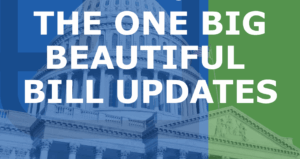The "One Big Beautiful Bill Act" (OBBB) represents the most sweeping set of tax reforms since the Tax Cuts and Jobs Act (TCJA) of 2017.

The OBBB extends, enhances, and in some cases fundamentally restructures a wide range of tax provisions affecting both individuals and businesses. Below, we break down the most significant changes and what they could mean for taxpayers.
Key Individual Tax Law Changes
1. Permanent Lower Individual Tax Rates
- The OBBB makes the lower individual tax rates introduced by the TCJA permanent, removing the previous sunset after 2025. This means the current seven-bracket system, with a top rate of 37%, will continue indefinitely, providing rate certainty for taxpayers.
2. Standard Deduction and Personal Exemptions
- The increased standard deduction is made permanent and further enhanced: $31,500 for married couples filing jointly and $15,750 for singles, effective after 2024.
- Personal exemptions remain suspended, except for a new $6,000 deduction for seniors (age 65+), available through 2028 and phased out at higher incomes.
3. Child and Family Tax Benefits
- The Child Tax Credit is permanently increased to $2,200 per child, with inflation adjustments and stricter Social Security Number requirements for both the taxpayer and child.
- The Child and Dependent Care Tax Credit is enhanced, with a higher maximum percentage and more generous phaseouts.
4. State and Local Tax (SALT) Deduction
- For 2025, the SALT deduction cap is temporarily increased to $40,000 ($20,000 married filing separately), with a phase-down for high-income taxpayers and a floor of $10,000. After 2029, the cap reverts to $10,000.
- The new framework introduces complex rules for passthrough entity tax (PTET) frameworks, limiting their availability and imposing new compliance burdens on partnerships and S corporations. Only certain state and local income taxes paid by qualifying passthroughs engaged in qualified trades or businesses (QTBs) are excepted from the cap, subject to a 75% gross receipts test and other requirements.
5. Itemized Deductions and Other Personal Deductions
- The suspension of miscellaneous itemized deductions is made permanent, except for educator expenses (now expanded).
- A new limitation on itemized deductions reduces deductions for high-income taxpayers.
- The mortgage interest deduction cap of $750,000 is made permanent, and mortgage insurance premiums are now treated as interest.
- The casualty loss deduction is limited to federally or state-declared disasters.
6. Other Notable Individual Provisions
- Above-the-line charitable deduction is increased to $1,000 ($2,000 joint) and made permanent, but a 0.5% AGI floor is imposed.
- The American Opportunity and Lifetime Learning Credits now require a Social Security Number for the taxpayer and student.
- New temporary deductions for tips and overtime pay are introduced for 2025–2028, with income-based phaseouts.
- The estate and gift tax exemption is permanently increased to $15 million (indexed for inflation).
Key Business Tax Law Changes
1. Research and Development (R&D)
- Domestic R&D expenditures can now be fully expensed immediately, reversing the prior requirement to amortize over five years. Foreign R&D must still be amortized over 15 years.
2. Qualified Business Income (QBI) Deduction (Section 199A)
- The QBI deduction is enhanced: the phase-in threshold for wage and property limitations is increased to $75,000 ($150,000 joint), and a $400 minimum deduction is established for active business income, with inflation adjustments.
- The deduction remains at 20% of qualified business income, but the OBBB clarifies and tightens the rules for specified service trades or businesses (SSTBs) and passthroughs.
3. Full Expensing and Depreciation
- 100% bonus depreciation (full expensing) for qualified business property is made permanent, with transitional options for reduced percentages in 2025.
- Section 179 expensing limits are increased to $2.5 million, with a phaseout at $4 million, both indexed for inflation.
- A new 100% expensing provision is introduced for certain nonresidential real property used in qualified production activities.
4. Business Interest Deduction (Section 163(j))
- The EBITDA add-back for the business interest limitation is restored permanently, increasing allowable business interest deductions.
- The limitation now applies before capitalization, and disallowed interest is not subject to future capitalization.
5. Other Business Provisions
- The paid family and medical leave credit is made permanent and expanded.
- The employer-provided child care credit is increased to 40% (50% for small businesses), with a higher maximum credit.
- The new markets tax credit and low-income housing tax credit are made permanent and enhanced.
- The opportunity zones program is renewed and expanded, with new reporting and rural opportunity fund options.
6. Energy and Environmental Credits
- Many clean energy credits, including those for clean vehicles, energy-efficient home improvements, and alternative fuel property, are terminated or restricted, with new limitations on foreign ownership and materials for certain credits.
Potential Impacts
For Individuals
- Taxpayers in high-tax states may benefit from the temporary increase in the SALT cap, but high-income individuals will see a phase-down of this benefit.
- Families with children will see larger and more accessible credits.
- Homeowners will continue to face a cap on mortgage interest and SALT deductions, but with some expanded eligibility.
- Seniors gain a new deduction, but only for a limited period and subject to income phaseouts.
- Employees in tipped or overtime-heavy industries may benefit from new temporary deductions.
For Businesses
- Small businesses and passthroughs benefit from a more generous QBI deduction and permanent full expensing, but must navigate new compliance requirements, especially regarding state and local tax deductions.
- Capital-intensive industries (e.g., manufacturing, real estate) benefit from permanent bonus depreciation and expanded Section 179 expensing.
- R&D-heavy businesses can immediately expense domestic research costs, improving cash flow.
Important: These are all new changes, and further guidance from the IRS and Treasury Department is expected. The details may change as new regulations and clarifications are issued. Be sure to consult with your tax advisor to understand how these changes affect your specific situation.
RUDLER, PSC CPAs and Business Advisors
This e-Tip is presented by Alexis Ludtke, CPA.
If you would like to discuss your particular situation, contact Alexis at 859-331-1717.

As part of Rudler PSC’s commitment to true proactive client partnerships, we have encouraged our professionals to specialize in their areas of interest, providing clients with specialized knowledge and strategic relationships. Be sure to receive future Rudler articles for advice from our experts, sign up today !